 Teacher Feature...
Teacher Feature...
The Maiden Week
by P R Guruprasad
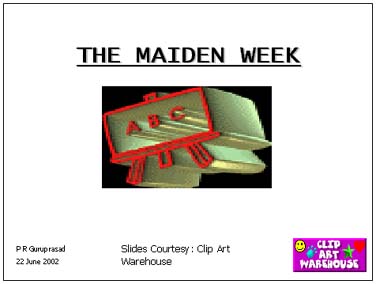
Click the image for a larger view.
The First week in school is the most important period in the academic life of the school. This is the most appropriate time for initiating strategies particularly in terms of human relations [all other pedagogic effects will come later]; when we say human relations we mean all those concerned with the education of the child viz. parental community, teachers and children. First week at school is the time when many children begin to understand each other and the teachers. This understanding, as we all know, is fundamentally important in molding the lives of children, the prime responsibility of any school.
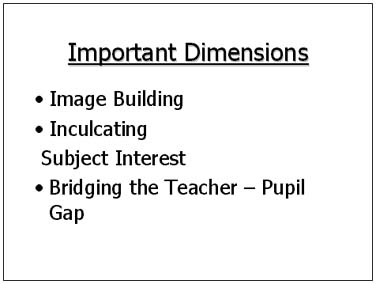
Click the image for a larger view.
We should, as teachers, project a good image of ourselves. Sometimes, teachers seem to have more influence on kids in how they think and act than any others including parents.
Let us be a role model.
Unless we exhibit our own interest in the curricular subject area, it is not easy to convince kids to become interested.
One of the main reasons why children don't do well in school is because the teacher is not easily accessible by kids [emotionally as well as pedagogically]. Let us get closer to kids very much like a good parent.
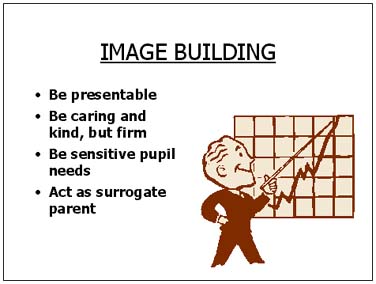
Click the image for a larger view.
We should look dignified and speak with soft, low-pitched voice [except in specific teaching situations which call for voice modulation, like for instance when story telling or enacting Ulysses and the 'Cyclops']. Children in particular as well as parents and colleagues who are exposed to the school for the first time observe us keenly.
Let us be caring and kind but firm: There is a distinct difference between being liberal and being kind. We should be firm but not harsh in maintaining discipline. Let us set an example to children [they emulate us]. [As shown in the 1960s movie 'To Sir With Love' or more recently in 'Kindergarten Cop', thanks, Arnold Swartznegger!]
Let us be sensitive to pupil needs: Empathising is more important than sympathizing.
Let us act as surrogate parent: We don't exist but for our children in the class. Parents and the school management have vested great faith in us, the teachers. Hence, it is our moral obligation to live up to their expectations. We cannot fulfil this responsibility unless we treat all children in the classroom as our own. Remember the Village School Master in Oliver Goldsmith's 'Deserted Village'? Let's BE the role as best as possible.
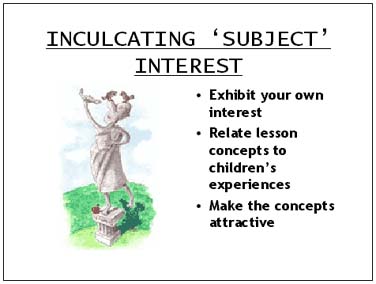
Click the image for a larger view.
We should not only be interested in the subject area we teach, but also let kids know this.
Relating lesson concepts to children's everyday situations is the most important requirement of any good teaching learning.
Teachers are like salespeople. The only difference is that we deal with young children; but this one difference makes a great difference. When we sell 'concepts' [some of them being abstract] it is our duty to make them attractive by using teaching aids so that children understand and remember the concept/s and apply them in problem situations.
All these can most effectively be begun in the first week of school.
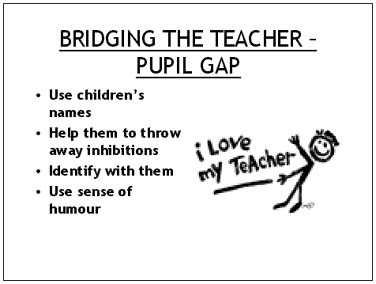
Click the image for a larger view.
Children get closer to us when we use their names to address them. This is the starting point for a healthy relationship between the teacher and the learner. Identifying with kids and using good humor go a long way in making the child COMFORTABLE.
You can download this article in its original PowerPoint format here - THE MAIDEN WEEK.ppt
If you do not have PowerPoint installed on your computer, you can download a free copy of PowerPoint Viewer here - http://office.microsoft.com/ downloads/2000/Ppview97.aspx
| 
